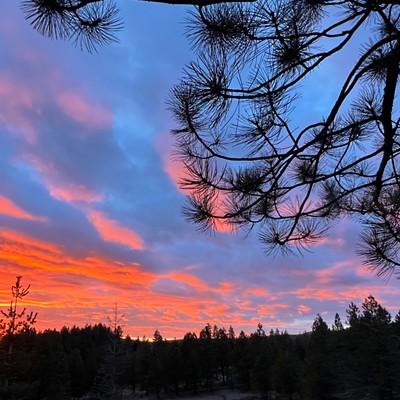It’s time for a summer-themed round of “Legal or Not Legal,” a game that tests your knowledge of the law.
We checked in with Washington and Idaho state police, Quad Cities police departments and fish and game departments in both states to find out which of these common summertime activities are legal and which are not.
Before you get started, remember that laws vary from state to state, county to county and city to city. Also note that “legal” and “advisable” are two different words; for your own safety, don't confuse the two.
Let’s play: Is this legal or not legal?
- Hitchhiking
- Throwing an apple core out the car window
- Urinating behind a roadside bush
- Skinny dipping
- Riding in the back of a pickup truck
- Spitting on the sidewalk
- Leaving pets or children unattended in a parked car
- Killing a rattlesnake that is not a threat to life or property
- Carrying more passengers than available seat belts
- Driving barefoot
ANSWERS
- Not legal in Idaho, sometimes legal in Washington. Whether or not you’re allowed to stand on the road and bum a ride from strangers has everything to do with where you are. If you’re in Idaho, forget about it -- it isn’t legal anywhere in the state. But if you’re in Washington, you’re probably OK on an open roadway. Just avoid on- and off-ramps and any place where signs are posted to the contrary.
- Not legal. Aside from any potential littering charges, it is illegal to throw any type of debris from a vehicle in both states; that apple core could cause problems if it hits the vehicle behind you. Littering laws also apply in such instances, whether what you toss is biodegradable or not.
- Not legal. This largely falls under the category of “public nuisance,” which says that you can’t do anything in public that is injurious to health, indecent or offensive to the senses. In addition to state laws, most cities have specific codes against urinating in public places, though some simply state that you can’t urinate in public view. Now, if you're hiding behind a car or bush along a highway with too few rest stops, it's unlikely you'd be issued a citation -- but you could be.
- Sometimes legal. In both Washington and Idaho, if anyone sees more of you than they bargained for and is offended, then you may be charged with public indecency or public exposure. That’s true if you’re at the city pool, up the river or even in your own backyard in full view of your neighbor. Now, if you’re at a remote alpine lake and no one’s around to be offended, you’re probably safe.
- Sometimes legal. This one is tricky. In Washington, it is legal for adults to ride in the back of an open truck bed as long as all of the seat belts in the cab are being used. If you’re younger than the age of 16, though, you’ve got to be wearing a seat belt, so no truck bed rides for you. Idaho law is a bit more vague. Anyone 6 years and younger is required to be in an appropriate child safety seat, which eliminates the truck bed option.Those older than 6, though, are only required to properly use the restraint provided by their seat -- implying that a person 7 and older can ride in the back of a pickup truck.
- Legal. Local law enforcement couldn’t find anything specific on the books to support the urban legend that spitting on the sidewalk is illegal. But what they do agree on is that it’s gross and could be cited as a public nuisance.
- Not legal. Leaving a child in a parked car not only poses a risk to the child, but it opens you up for charges of child endangerment, neglect or abandonment. While neither state specifies at what age or contexts a child can be left in a parked car, in Washington it's never legal to leave a child in a car with the motor running or parked outside a liquor establishment and some cities state that children younger than a certain age cannot be left in a parked car. As far as animals, laws against animal cruelty come into play when an animal is left in a hot car and some cities have further code that an animal cannot be unattended when in public.
- Legal in Washington, sometimes legal in Idaho. If you’re in Washington, rattlesnakes are fair game, but in Idaho, you need either a hunting license or a good excuse to kill one. If the snake is a threat to life, limb or property -- hanging out in the backyard where your kids play, for example, you’ve got full right to dispose of it. But if you’re on a public trail and encounter one, even if it’s ready to strike, you’ll have a hard time justifying to a game warden that the snake was a threat and killing it was justified. Now, that’s not to say you can’t go kill you some rattlesnakes. But if you’re going to collect rattlesnakes in Idaho, dead or alive, you’ll need a hunting license and limit your haul to four snakes at a time. And if you’re planning to keep that live rattlesnake as a pet -- yes, that’s legal -- you’ll need to follow certain containment regulations.
- Not legal. Both Washington and Idaho law states that everyone riding in an automobile seat must be properly wearing the seatbelt for that seat. Idaho law states that more people than seat belts can be in the backseat of a vehicle, but city and county laws may vary and supersede that.
- Legal. It used to be that driving barefoot was illegal, but laws in both Idaho and Washington have since been changed. That said, a barefoot can be less stable so it is generally advised to wear appropriate footwear for driving.
SCORING:
8-10 answers right: You're one astute citizen. Congratulations on state and city code familiarity -- now all you have to do is follow it.
4-7 answers right: You've narrowly missed a citation or two. Good thing we've got you covered.
1-3 answers right: You're lucky you're not reading this from a jail cell. Time to brush up on your laws.























